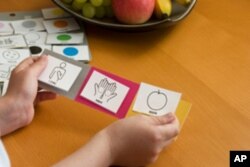American scientists think they have developed a test – using MRI brain scans – that can determine whether someone has autism.
Up until now, there has been no clear biological test to objectively conclude if someone has autism. Doctors currently diagnose autism, usually in children, by observing behavior and interactions with others.
Efforts to find a more biological test have generally failed. Most researchers have focused on looking at various structures in the brain, to see if autistic patients differed from normally-functioning people. But they've come up empty.
Nicholas Lange of Harvard Medical School and his colleagues decided to look for abnormalities, not in the functional structures of the brain, but in the circuitry that links them together.
"The brain may be okay, the parts that do the work may be okay," he said. "But the wiring – the 'cables' between the points in the brain, one to another – may be disrupted in some way."
The brain's circuitry, known as white matter, can be seen with an MRI [magnetic resonance imaging] scan. In particular, Lange used a technique called diffusion tensor imaging, which detects how organized the brain's circuits are.
He likens it to a package of spaghetti, "... where there's a bundle of uncooked spaghetti, and there's a clear directionality to that. It's nice and well-organized, as opposed to a cooked bowl of spaghetti that's just a tangle of – it looks like spaghetti And that's the way the wiring can be. It can be either very tangled, it can be very organized."
Using the MRI scans, the researchers determined how organized the connections were in two areas of the brain that control language and social functioning.
According to a new paper published online by the journal Autism Research, they found that they could determine whether the person had autism – with 94 percent accuracy.
Lange says a subsequent study to confirm the finding was even more accurate, making this the best biological test so far for autism.
While this test is helpful for researchers, Lange says it needs more validation to be used as a tool for diagnosis. Eventually, he suggests, it might be able to confirm autism earlier than about age three, which is currently regarded as the youngest a patient can be diagnosed as autistic.




